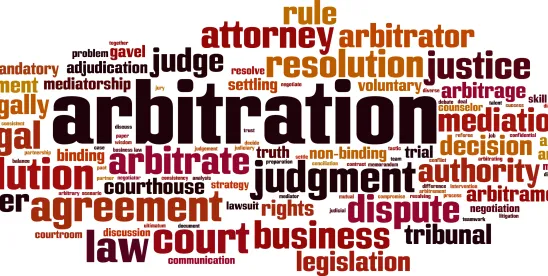I have practiced law for 40 years with the vast majority as a “construction” lawyer. I have seen great… and bad… construction lawyering, both when representing a party and when serving over 300 times as a mediator or arbitrator in construction disputes. I have made my share of mistakes and learned from my mistakes. I was lucky enough to have great construction lawyer mentors to lean on and learn from, so I try to be a good mentor to young construction lawyers. Becoming a great and successful construction lawyer is challenging, but the rewards are many. The following is No. 8 of the top 10 mistakes I have seen construction lawyers make, and yes, I have been guilty of making this same mistake.
Most (but not all) commercial construction contracts contain binding arbitration clauses. Whether the contract is between an owner and architect/designer, an owner and prime contractor, or a subcontractor and prime contractor, the decision to arbitrate or litigate a dispute is always negotiable. You can refer back to one of my previous blog posts in this series discussing the pros and cons of binding arbitration vs. litigating in court. But when parties have decided to arbitrate a dispute, the next question is what rules will apply and how will the arbitration be administered?
Most arbitration clauses (especially those in the standard AIA form set of construction project documents) specify that the American Arbitration Association (AAA) will “administer” the arbitration and that the construction rules of the AAA will apply (the “AAA Rules”). Per the AAA Rules, a party filing an arbitration pays a filing fee to the AAA, the amount of which is based on the amount of the claim. For example, the total non-refundable fee (with few exceptions) for a claim (or counterclaim) from $500,000 to $1 million is $12,675. A claim from $1 million to $10 million is $17,450. There are other AAA fees to pay as the process continues. The other primary costs are the compensation (normally hourly) of the selected arbitrator (or panel).
There are many experienced construction lawyers who are unhappy with the administrative services provided by the AAA (I am not one of them) when taking into consideration the amounts charged by the AAA to the clients. Their arguments are as follows: “I know who the good and bad arbitrators in my area are. My clients do not need to pay the huge AAA filing fees to just get a list of potential arbitrators. And once chosen, a good arbitrator takes over the administration of the arbitration and all the AAA case manager does is set up calls (when the arbitrator does not do so), collects the estimated arbitrator fees from the parties, sends out notices and pays the arbitrator.”
Because of the arguments above, and other concerns, there is a growing trend for parties and their construction lawyers, even with an arbitration clause that calls for AAA administration, to completely “bypass” the AAA and have the arbitration administered “privately.” Over the past five years, I would estimate that 33% of the arbitrations for which I have served as an arbitrator (including on a panel of 3 arbitrator) over the past 3 years have been privately administered. What this means is that the parties agree to amend the arbitration clause; enter into a private arbitration agreement (which may call for portions of the AAA Rules to apply); and agree on an arbitrator(s). There can also be an agreement to a private arbitration without a pre-existing arbitration clause. While the arbitrator’s rates will normally be the same as the rates charged by the AAA, the obvious savings to the clients is that the AAA’s initial filing fees and other charges are avoided.
On first blush, especially for large claims and counterclaims, this may look like a win-win for the clients. However, before you go off and recommend this to your clients, you better be fully aware of the risks and issues that can arise.
- Avoid issues by having an agreed private arbitration agreement.
If the arbitration clause calls for AAA Rules, and the parties agree to private arbitration, there should always be a carefully well-drafted private arbitration agreement signed by the clients. It should, among other items, set forth what rules will be applicable; what pre-hearing discovery will be allowed; identify the agreed arbitrator (and at what hourly rate); outline the requirement to split the arbitrator compensation; and determine a process if, for whatever reason, the existing arbitrator must withdraw prior to the hearings. I do not agree to serve as a private arbitrator without such an agreement in place (which is where I obtain my authority to issue a binding award). Also, do not forget that such an agreement is a “contract,” and there can be clauses included that were not in the original contract, such as a prevailing party attorneys’ fees/arbitration expenses clause or even an agreement for the most convenient hearing location (not the location of the project). Last year I served as a private arbitrator on a project located in Alabama with counsel in Atlanta, Tennessee and Colorado, and the hearings were in my firm’s offices in Nashville.
- Involve your client in the arbitrator selection.
In the AAA process for selecting an arbitrator, the AAA sends a list of potential arbitrators to both counsel, who then send in a confidential list to the case manager with names crossed off and an order of preference (much like jury selection). The case manager then reviews the list and appoints the arbitrator (subject to conflicts). In a private arbitration, both sides must agree on an arbitrator. In most instances, the client will not have any idea of any potential arbitrator, so the client will be heavily relying on your advice, albeit tempered by the admonition that there cannot be any guaranties on how an arbitrator might rule. Another previous blog post in this series discussed the issues of not vetting potential arbitrators. The point here is to involve your client and explain who has been suggested as the private arbitrator. Because if the agreed upon arbitrator rules against your client, despite your fantastic efforts, a losing, disgruntled client may ask (when presented with your final post-hearing invoice), “I don’t recall agreeing to this arbitrator: why did you recommend we use that guy? You told me he would call balls and strikes, and he did not.”
- Managing post-arbitrator selection conflicts can be tricky.
While any potential private arbitrator will disclose any conflicts (same process as the AAA), arbitrator conflicts can come up after selection. An example would be the later disclosure of expert witnesses or fact witnesses. If that arbitrator uses or has used one side’s designated expert, there should be a disclosure. The difference is that when the AAA administers the case, if a disclosure is necessary, the arbitrator discloses to the case manager who then deals only with counsel. Under the AAA Rules, the AAA has the sole discretion to rule on whether the arbitrator can continue to serve. In a private arbitration, the arbitrator must manage the conflict directly with counsel. One solution is to designate, in the private arbitration agreement, another qualified arbitrator who is authorized by the parties to rule on any conflict.
- Handle party nonpayment issues.
When the AAA administers a case, the arbitrator provides an estimate of his total compensation/expenses, and the AAA bills each side one-half of the estimate. The payments go into the AAA “bank.” The arbitrator sends invoices to the AAA, and the AAA pays the arbitrator from the deposits. The difference is if one side does not pay its share. If a AAA administered arbitration, the case manager manages it internally and does not inform the arbitrator which side has not paid. If the payment is not timely made, the arbitrator is then given the option of proceeding with the hearings or putting the arbitration on hold. The AAA does give the paying party the option to pay the other side’s portion (but most of the time this does not happen). In a private arbitration, the arbitrator is the “bank.” The pre-payments are made to her, and obviously she knows which side has or has not paid.
The bottom line is not making the mistake of allowing the “benefit” of a client not having to pay the AAA fees with the real and material issues that can occur with a private arbitration. Having good, experienced counsel on both sides helps, as well as knowing that many of the identified issues can be anticipated in a well-drafted private arbitration agreement.




 />i
/>i
